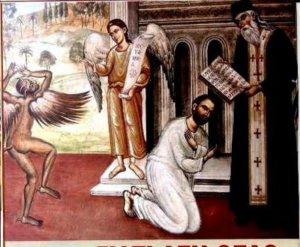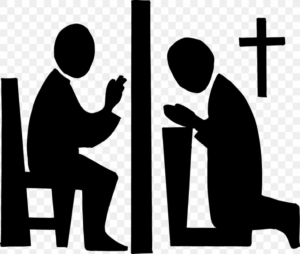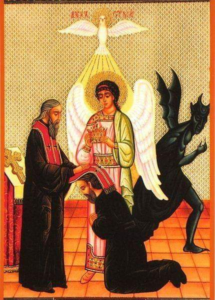The Mystery of Holy Confession (Penance)

Holy Confession is a Mystery (Sacrament), in which the penitent confesses his or her sins to God before an ordained priest, who is a representative of Lord Jesus Christ. The priest acts on behalf of Jesus Christ and forgives the sins and the penitent receives the grace of forgiveness of sins from God, through the priest.
Holy Confession is also called as Sacrament of repentance or penance. Repentance and Remission of sins are the two vital ingredients of this sacrament, with a promise that a penitent undertakes not to commit sin again. So acknowledgement of one’s guilt, forgiveness of one’s sins and Reconciliation with God Almighty are the components of the sacrament of confession. The mystery of repentance is a mystery, by which one has decided to renounce one’s sins and sinful direction of one’s will, by which he/she had lived hitherto, asks God to forgive his/her past sins, to destroy his/her sinful will within and to give strength to live hence forth to Christ’s law.
What is sin?
Sin is disobedience to God’s will. It is not doing what we ought to do and doing what we ought not to do. Sin separates us from God and our fellow brethren, resulting in the loss of power, joy, peace and hope, leading to our spiritual death. “The wages of sin is death” (Rom. 6: 23). So sin is, man placing his own will above the will of God and above the love for fellow men. Literally Sin: Gk. – hamartia – ‘missing the mark’. All those who miss the mark of perfection that God has set for his people. (Mt. 5: 48; Rom. 3: 23)
What is repentance?
Repentance means changing of the mind, of thoughts, attitudes and feeling. It is recognition of the responsibility and the guilt for the committed sins and man’s sinful nature. This attitude needs to be accompanied by a willingness to change our ways and a continual will and effort not to remain in the state of sin.
Who is a penitent?
A penitent is a person regretting or wishing to atone for his/her own sins or a repentant sinner doing penance under the direction of a confessor. A true penitent is one with a contrite heart.

What is the purpose of Holy Confession?
The Sacraments of Holy Confession is for the deliverance of sinners, from the bondage of sins. So that one can live and lead a better, higher and godly life, following the footsteps of our Lord. It enables man to live in a sphere of grace, to continue in a state of righteousness and to climb the spiritual ladder that never ends. Our separation from God’s life and from the Kingdom of the Triune God leads us to corruption, despair and death. Through Holy Confession, God restores to the repentant sinner all the privileges of a son of God, Who is the source of all life and joy.
It is also a necessary and a compulsory pre-requisite to the sacrament of Holy Qurbana. “Whoever eats the bread or drinks the cup of the Lord in an unworthy manner will be guilty of sinning against the body and blood of the Lord. A man ought to examine to examine himself before he eats of the bread and drinks of the cup (1 Cor. 11: 27-28). Thus only after receiving Holy Confession can we receive Holy Qurbana. If you receive holy Qurbana in an unworthy manner then “For any one who eats and drinks without recognizing the body of the Lord, eats and drinks judgement on himself. That is why many of you are weak and ill and some have died” (1 Cor. 11: 29-30).
Why confess before a priest?
Our Lord Jesus Christ instituted this sacrament after His resurrection. Directing Himself to the disciples He said, ” Receive the Holy Spirit, if you forgive the sins of any, they are forgiven and if you retain the sins of any, they are retained” (Jn. 20: 22-24; Mt.18: 18; Mt. 16: 19). Here the priests are given the authority and power to forgive the sins of the penitent. The words of Christ are very clear. They leave no room for doubt. His disciples, and later on their successors, (Bishops and Priests – who received the anointing from generation to generation through apostolic succession) alone and no one else have the right to forgive or not to forgive the sins of man. In essence they are instruments of Christ and it is Christ who forgives the sins of man. He gave this authority to the Apostles and the apostles to their successors, the Bishops and Priests. He did not give this authority to the any one else, not even to the angels. So let no say that he or she can confess to God Himself, or to saint, or to an icon. NO. IT CAN BE DONE ONLY TO A BISHOP OR TO A PRIEST.

When we confess our sins before a priest, the confession becomes real. As the presence of a priest, on behalf of God, makes the fact more concrete that God is listening to the penitent. The priest, who serves as a connecting link between God and the penitent, reveals God’s presence as His mouthpiece and a channel of bestowing His grace. When we pray privately, we may always have our doubts. Did God forgive me? But when the penitent hears the liberating words of absolution, the glorious words of freedom pronounced by the priest, appointed by God, the reception of forgiveness of sins becomes a real experience. The guilt complex is broken, the sense of aloofness with God is removed and the penitent is purged of all sins. We then resolve to “go and sin no more” (Jn. 8: 11)
Confession is not only the pouring out and emptying of the accumulated and hidden sinful impurities, from the soul, but also a pouring out of grief, burdens and sorrows. So the time of confession is a spiritual sharing too, with the priest. Unless confessed the suppressed sins and burdens will become dangerous like steam without vent. Confession serves as a safety valve to them. The penitent is thus relieved of all that hurts him even in the sub-conscious mind.
Our Savior Jesus Christ commissioned His Church to preach “the repentance and forgiveness of sins to all nations” in His name. …………. and repentance for the forgiveness of sins will be preached in his name to all nations, beginning at Jerusalem (Lk. 24: 47). He does not want anyone should be lost, but that all be brought to repentance”. ……… The Lord is not slow in keeping His promise, …………. not wanting anyone to perish, but everyone to come to repentance. (2 Pet. 3: 9), Our Lord endowed the Church with the power to forgive sins to priests, by instituting the Holy Mystery of Penance, which is simply known as – Confession. The Holy Mystery of Penance is the mystery instituted by Jesus Christ to forgive, in His name, the repentant sinner all his or her sins committed after baptism.
Confession before a priest also means that the penitent can get spiritual guidance and pastoral care from the priest according to the needs an individual. More so the priest is enabled to pray effectively for the penitent, because he realizes the spiritual needs of the penitent. The priest also gets an opportunity to pray along with the penitent, for the remission of sins. “Again I say to you, if two of you agree on earth about anything they ask, it will be done for them by My Father in heaven” (Mt. 18: 19).

The presence of a priest helps confession to be more reflective, less rationalised and more honest. He can act as a mirror for us, which feed back things we would be more likely to avoid on our own. The priest can guide us into deeper prayer life and scriptural reading. He becomes our spiritual father, nurturing us with the Words of Christ, through the power of Holy Spirit, in our journey to the Father.
God’s Word promises “If we confess our sins, He is faithful and just to forgive us and cleanse us from all unrighteousness” (1 Jn. 1: 9). The faithful are to bring their sins to God in repentance and receive cleansing and forgiveness. From the beginning, Christians understood that, the grace of ordination endowed the shepherd of the flock with discernment and compassion to speak the words of remission, on behalf of Christ, our Lord. St. John Chrysostom says, “The priests decree below, God confirms above”. The presence and the power of Christ’s forgiveness remains in the Church and in the Church all His Gifts reside. Confession to priest is totally based on the Holy Bible and Holy Tradition. King David confessed his sins to Prophet Nathan, and Nathan conveyed to David the absolution of sins by God. (2 Sam. 11: 1-12:13). Achan confessed his sins to Prophet Joshua. (Joshua 7: 16-20). The Holy Bible says that one should consult the priest to learn from him. “For the lips of the priest should preserve knowledge and from his mouth men should seek instruction – because he is the messenger from the Lord Almighty” (Mal. 2: 7).
People ask, “Can’t I confess to God directly and privately”. Secret or private confession is a modern idea completely unknown in the Bible and through out Christian history. Public confession is not only difficult, but may be harmful.
0 Comments